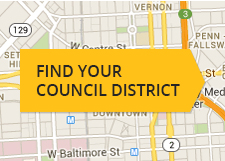COVID-19 Renter Relief Act and Comprehensive Crime Plan Bill, Sponsored by Council President Scott Become Law
COVID-19 Renter Relief Act and Comprehensive Crime Plan Bill, Sponsored by Council President Scott Become Law
Council President’s Renter Relief Act Signed By Mayor; Biennial Comprehensive Crime Plan Bill Goes Into Law Without Signature
BALTIMORE, MD (May 29, 2020) -- After making their way through the legislative process, two pieces of legislation sponsored by Baltimore City Council President Brandon M. Scott have become law.
The Baltimore COVID-19 Renter Relief Act, which was introduced by the Council President in response to economic uncertainty facing Baltimoreans during the pandemic, was signed by Mayor Young last week. Additionally, the Council President’s legislation that would require any Mayor of Baltimore to have a comprehensive strategy to fight crime has become law without the Mayor’s signature. This bill was part of the Council President’s legislative agenda released in July 2019.
The Baltimore City COVID-19 Renter Relief Act (Bill 20-0526) prohibits landlords from announcing rent increases during a declared state of emergency and within the 90-day period after the state of emergency is lifted. It also prohibits fees for late payment or no payment of rent, as well as all rent increases that are scheduled to take place during the state of emergency. The law went into immediate effect on Monday, May 18 with the Mayor’s signature.
“Our residents shouldn’t be worrying about rent increases or fees during the biggest public health crisis of our lifetime," said Council President Scott. "This bill was introduced to help our residents weather the current public health pandemic, but if we’ve learned anything from COVID-19, this impacts all of us -- especially our most vulnerable communities. This law will now extend protections to our residents any time there is a declared state of emergency, even beyond COVID-19.”
Additionally, Council President Scott’s Biennial Comprehensive Crime Reduction Plan (19-0451) became law without the Mayor’s signature and was immediately enacted. This law requires the Health Department to coordinate with city and state agencies to develop a comprehensive crime reduction strategy. The strategy would be made public, presented to the City Council, and required to be revised at least every other year on or before June 30. All public comments received will become part of the plan considered by the Council.
The comprehensive crime strategy must also include an analysis of criminal justice data, an assessment of holistic, non-policing efforts aimed at crime reduction, and the establishment of goals, priorities, and standards for crime reduction in Baltimore.
“Even though this legislation went into effect without a signature from the Mayor, I am proud of this legislative victory so that Baltimore never again goes years without a truly comprehensive, holistic public safety strategy,” said the Council President. “It was unacceptable when our city went two years without a comprehensive public safety plan. We know BPD cannot do this job alone; all of our city agencies must understand where they fit into ending violence in our city. With the crime and murder rates still climbing despite a major public health pandemic, we must ensure that Baltimore is bringing every city resource to bear to fight gun violence and save lives.”
The Council President outlined the Baltimore City Council’s long fight for a crime plan, which started when the Council President chaired the Public Safety Committee, in this timeline.
This bill was originally outlined in the Council President’s Legislative and Policy Agenda, released July 2019. Members of the public can use the Council President’s Legislative and Policy Tracker to see the status of all bills and initiatives presented in the agenda.
CONTACT
Candance Greene
Deputy Director of Communications
Office of City Council President Nick J. Mosby
443-602-5346
candance.greene@baltimorecity.gov

